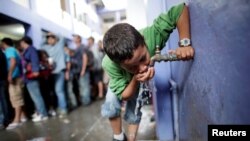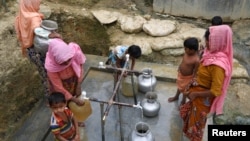Yogita has to fetch water up to six times a day - sometimes going out in the middle of the night - from a hand pump about half a kilometer from her house in India's Madhya Pradesh state, leaving her baby son with a neighbor.
In the summer, her husband cycles three kilometers to get the family's water, and shouts at the 25-year-old if she cannot prepare meals at the right time because she is out getting water.
"I haven't eaten anything all day as fetching water was the most important task at hand," she said in a report from international charity WaterAid showing the impact of global consumption on water-short communities worldwide.
Exports of crops - like coffee, rice, avocados and cotton - are important sources of income for many countries.
But large amounts of water are used to produce them, even as poor communities struggle to get enough for their basic needs, a situation made worse by climate change, WaterAid said in the report published on Tuesday.
The world must ensure "the push for economic development through exports of food and clothing does not imperil current and future generations' access to water", said WaterAid UK Chief Executive Tim Wainwright ahead of World Water Day on March 22.
India, for example, is the world's third largest exporter of groundwater, accounting for 12 percent of the global total.
Meanwhile, the rate of depletion of its groundwater jumped by 23 percent between 2000 and 2010, and as many as 1 billion of its people live in water-scarce areas, WaterAid said.
Under global development goals agreed in 2015, governments pledged to provide access to safe and affordable drinking water for all by 2030.
But three in 10 people, or just over 2 billion, still do not have a "safely managed" service, meaning a water source on the premises - such as a piped supply or a well - free from fecal and chemical contamination.
In India, the government has done "reasonably well" in providing clean water close to people's homes, WaterAid India Chief Executive VK Madhavan told the Thomson Reuters Foundation.
Yet three-quarters of households still do not have water on tap, and there is a major problem with contamination by arsenic, nitrates, fluoride and salt, he added.
Priorities for the Indian government are to improve water quality and expand a pilot project to provide piped water in villages from 115 districts to the whole country, he said.
Poor pay more
The 2019 U.N. World Water Development Report, also launched on Tuesday, said that while safe, clean drinking water and sanitation are human rights, the world is not on track to provide those things to everyone by 2030.
People who are poor or marginalized due to gender, age, ethnicity or religious identity are also more likely to have limited access to proper water and sanitation, the report noted.
It explores how to help three groups in that category: families living in urban slums, smallholder farmers in rural areas, and people uprooted by conflicts and disasters.
Editor-in-chief Rick Connor of UNESCO said that in cities, rich homes with piped water tended to pay far less per liter, while the poor in slums often had to buy water from trucks, kiosks and other vendors, shelling out 10 to 20 times more.
"The misperception is that they don't have water because they can't afford it - and that is completely wrong," with some spending up to 30 percent of their salaries on water, he told the Thomson Reuters Foundation.
Policies to ease that financial pressure include putting in stand-pipes shared by several households, and designing tariffs and giving rebates to make water more affordable.
In rural areas, one key solution is rainwater harvesting and storage systems to tide communities over in a drought and provide water to irrigate crops, such as a U.N.-backed program called "1 million cisterns for the Sahel" in West Africa.
For refugees, meanwhile, aid agencies are increasingly trying to provide water supplies and sanitation in ways that also benefit local people and avoid tensions, Connor said.
In northern Jordan's Zaatari refugee camp, for example, the government and agencies rehabilitated wells, and fixed up water and wastewater systems for Syrian refugees and communities nearby, easing pressure on limited resources, the report said.







